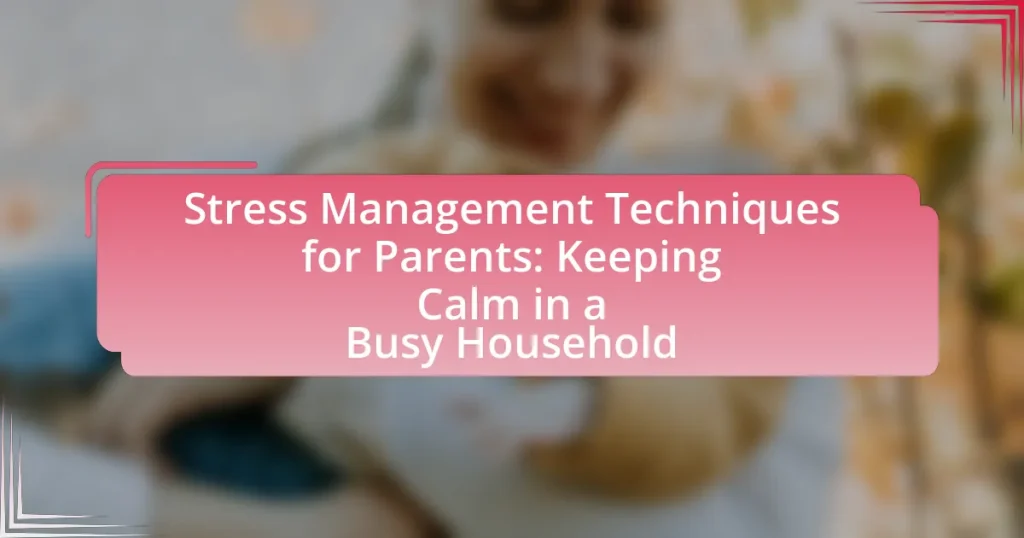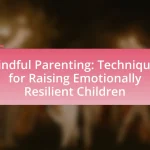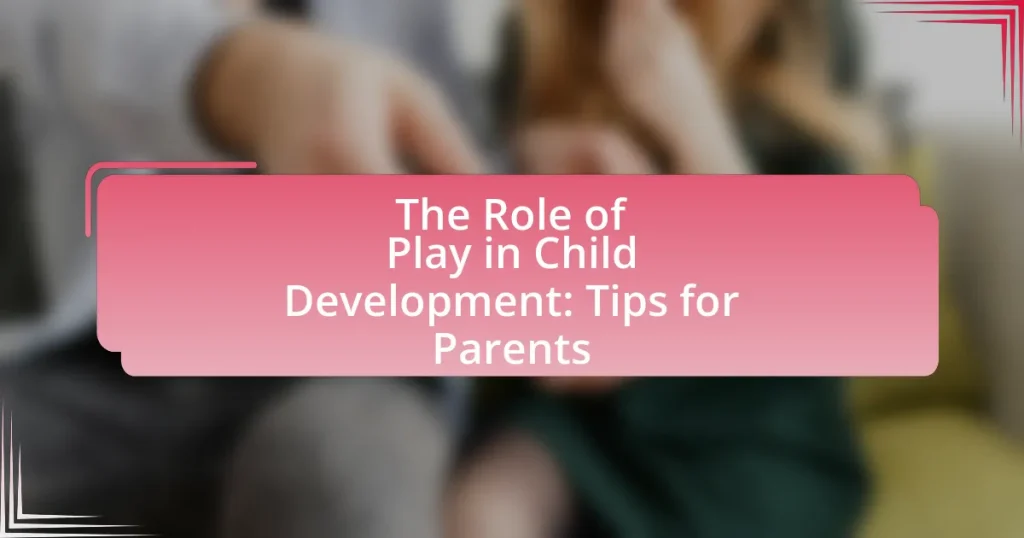The article focuses on stress management techniques for parents, emphasizing the importance of maintaining emotional stability in a busy household. Key strategies discussed include mindfulness practices, regular physical activity, effective time management, and seeking social support. It highlights how identifying stress triggers can help parents manage their responses and improve family dynamics. Additionally, the article explores the impact of parental stress on children and offers practical tips for creating a supportive home environment, effective communication, and long-term self-care practices. Resources for support and guidance are also provided to assist parents in navigating stress effectively.
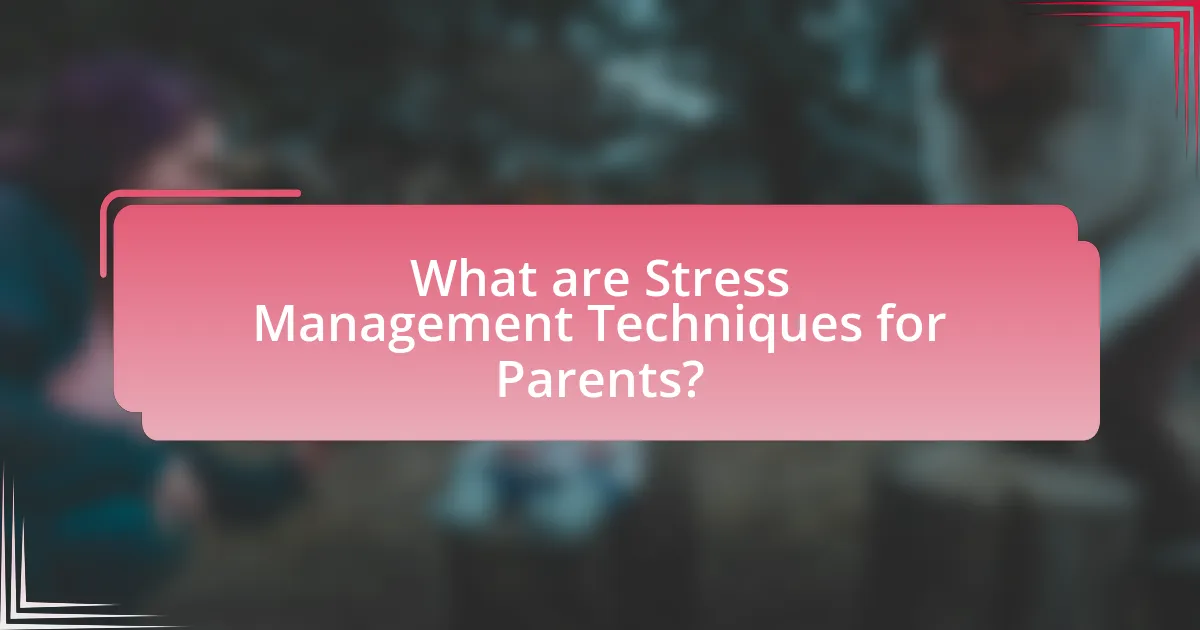
What are Stress Management Techniques for Parents?
Stress management techniques for parents include mindfulness practices, regular physical activity, effective time management, and seeking social support. Mindfulness practices, such as meditation and deep breathing exercises, help parents stay present and reduce anxiety. Research indicates that regular physical activity can lower stress levels and improve mood, with the American Psychological Association noting that even short bursts of exercise can be beneficial. Effective time management, including prioritizing tasks and setting realistic goals, allows parents to feel more in control and less overwhelmed. Additionally, seeking social support from friends, family, or parenting groups provides emotional relief and practical advice, which can significantly alleviate stress.
How can parents identify their stress triggers?
Parents can identify their stress triggers by maintaining a stress journal to track their feelings and reactions to various situations. This method allows parents to recognize patterns in their stress responses, such as specific events, interactions, or environments that consistently lead to heightened stress levels. Research indicates that self-monitoring can enhance emotional awareness, enabling individuals to pinpoint stressors more effectively. By reviewing their entries, parents can identify recurring themes and develop strategies to manage or mitigate these triggers, ultimately fostering a calmer household environment.
What common stressors do parents face in a busy household?
Parents in a busy household commonly face stressors such as time management, financial pressures, and balancing work and family responsibilities. Time management issues arise from juggling multiple schedules, leading to feelings of being overwhelmed. Financial pressures often stem from the costs associated with raising children, including education, healthcare, and daily expenses. Additionally, the challenge of balancing work commitments with family needs can create significant stress, as parents strive to meet both professional and personal obligations effectively. These stressors are well-documented in studies highlighting the impact of family dynamics on parental well-being.
How can recognizing triggers help in managing stress?
Recognizing triggers can significantly aid in managing stress by allowing individuals to identify specific situations or stimuli that provoke stress responses. When parents become aware of their stress triggers, they can implement proactive strategies to mitigate these stressors, such as modifying their environment or changing their reactions. Research indicates that understanding personal triggers can lead to improved emotional regulation and coping mechanisms, ultimately reducing overall stress levels. For instance, a study published in the Journal of Health Psychology found that individuals who identified their stress triggers reported a 30% decrease in perceived stress after implementing targeted coping strategies.
Why is stress management important for parents?
Stress management is important for parents because it directly impacts their well-being and the overall family environment. Effective stress management helps parents maintain emotional stability, which is crucial for making sound decisions and fostering a nurturing atmosphere for their children. Research indicates that high stress levels in parents can lead to negative outcomes for children, including behavioral issues and emotional distress. For instance, a study published in the Journal of Family Psychology found that parents who effectively manage stress are more likely to engage positively with their children, enhancing the parent-child relationship and promoting healthier development.
What impact does parental stress have on children?
Parental stress negatively impacts children by increasing their risk of emotional and behavioral problems. Research indicates that children of stressed parents often exhibit anxiety, depression, and difficulties in social interactions. A study published in the Journal of Family Psychology found that high levels of parental stress correlate with increased instances of aggression and withdrawal in children. Furthermore, the American Psychological Association highlights that parental stress can disrupt parenting practices, leading to inconsistent discipline and reduced emotional support, which further exacerbates children’s emotional difficulties.
How does managing stress improve family dynamics?
Managing stress improves family dynamics by fostering better communication and emotional connections among family members. When parents effectively manage their stress, they are more likely to engage positively with their children, leading to a supportive environment. Research indicates that families with lower stress levels experience enhanced relationships, as evidenced by a study published in the Journal of Family Psychology, which found that effective stress management techniques, such as mindfulness and open communication, significantly reduce conflict and increase family cohesion. This creates a nurturing atmosphere where children feel secure and valued, ultimately strengthening family bonds.
What are the most effective stress management techniques for parents?
The most effective stress management techniques for parents include mindfulness practices, regular physical activity, and establishing a support network. Mindfulness practices, such as meditation and deep-breathing exercises, have been shown to reduce stress levels significantly; a study published in the Journal of Health Psychology found that mindfulness can lower anxiety and improve emotional regulation. Regular physical activity, such as walking or yoga, not only boosts physical health but also releases endorphins, which are natural stress relievers. Additionally, having a support network of friends, family, or parenting groups provides emotional support and practical assistance, which can alleviate feelings of isolation and overwhelm.
How can mindfulness practices benefit parents?
Mindfulness practices benefit parents by enhancing their emotional regulation and reducing stress levels. Research indicates that engaging in mindfulness can lead to lower anxiety and depression rates among parents, which in turn fosters a more positive family environment. A study published in the journal “Mindfulness” found that parents who practiced mindfulness reported improved parenting satisfaction and better interactions with their children. This improvement is attributed to mindfulness’ ability to promote present-moment awareness, allowing parents to respond to challenges with greater patience and clarity.
What role does physical activity play in stress reduction?
Physical activity plays a crucial role in stress reduction by promoting the release of endorphins, which are chemicals in the brain that act as natural painkillers and mood elevators. Engaging in regular exercise has been shown to decrease levels of the body’s stress hormones, such as adrenaline and cortisol. Research published in the Journal of Clinical Psychiatry indicates that even moderate physical activity can significantly reduce symptoms of anxiety and depression, contributing to overall mental well-being. Furthermore, a study by the American Psychological Association found that individuals who engage in physical activity report lower stress levels and improved mood, highlighting the effectiveness of exercise as a stress management technique.
How can parents create a supportive environment at home?
Parents can create a supportive environment at home by fostering open communication and emotional safety. Establishing regular family meetings encourages children to express their feelings and concerns, which enhances emotional intelligence and strengthens family bonds. Research indicates that children who feel heard and understood are more likely to develop resilience and coping skills, essential for managing stress. Additionally, creating a structured routine provides stability, which is crucial for reducing anxiety in children. A study published in the Journal of Family Psychology found that consistent routines positively impact children’s emotional well-being, making them feel secure and supported.
What strategies can parents use to communicate effectively with their children?
Parents can communicate effectively with their children by actively listening, using clear and age-appropriate language, and fostering an open environment for dialogue. Active listening involves giving full attention to the child, which helps them feel valued and understood. Research indicates that children who feel heard are more likely to express their thoughts and emotions openly, leading to better emotional regulation. Using clear and age-appropriate language ensures that children comprehend the message being conveyed, reducing misunderstandings. Additionally, creating an open environment encourages children to share their feelings without fear of judgment, which is essential for healthy communication. Studies show that children thrive in environments where they feel safe to express themselves, leading to improved relationships and emotional well-being.

What specific techniques can parents implement daily?
Parents can implement daily techniques such as mindfulness practices, structured routines, and effective communication to manage stress. Mindfulness practices, like deep breathing or meditation, help parents stay present and reduce anxiety, as studies show that mindfulness can lower stress levels significantly. Establishing structured routines provides predictability, which can alleviate chaos in a busy household, leading to improved emotional well-being for both parents and children. Additionally, effective communication techniques, such as active listening and expressing feelings, foster a supportive environment, which research indicates can enhance family relationships and reduce stress.
How can time management reduce stress for parents?
Time management can significantly reduce stress for parents by allowing them to prioritize tasks and allocate time effectively. When parents organize their schedules, they can ensure that essential responsibilities, such as work, childcare, and household chores, are completed without last-minute rushes. Research indicates that effective time management leads to increased productivity and a sense of control, which are crucial for reducing anxiety levels. For instance, a study published in the Journal of Occupational Health Psychology found that individuals who practiced time management reported lower stress levels and improved well-being. By implementing structured routines and setting realistic goals, parents can create a more balanced environment, ultimately leading to decreased stress.
What tools can help parents organize their daily schedules?
Digital calendars, such as Google Calendar and Apple Calendar, can help parents organize their daily schedules effectively. These tools allow parents to create events, set reminders, and share schedules with family members, facilitating better coordination. Research indicates that using digital calendars can reduce stress by providing a clear overview of daily tasks and commitments, which helps in time management and prioritization. Additionally, task management apps like Todoist and Trello enable parents to break down responsibilities into manageable tasks, further enhancing organization and reducing overwhelm.
How can setting priorities alleviate feelings of overwhelm?
Setting priorities can alleviate feelings of overwhelm by providing a clear framework for decision-making and task management. When individuals prioritize tasks, they can focus on what is most important, reducing the mental clutter that contributes to stress. Research indicates that prioritization helps in managing time effectively, allowing individuals to allocate their energy towards high-impact activities, which can lead to a sense of accomplishment and control. For instance, a study published in the Journal of Occupational Health Psychology found that effective prioritization can significantly reduce perceived stress levels among working parents, as it enables them to tackle essential responsibilities first, thereby minimizing feelings of being overwhelmed.
What relaxation techniques can parents practice?
Parents can practice several relaxation techniques, including deep breathing exercises, mindfulness meditation, progressive muscle relaxation, and yoga. Deep breathing exercises involve inhaling deeply through the nose, holding for a few seconds, and exhaling slowly through the mouth, which can reduce stress and promote calmness. Mindfulness meditation encourages parents to focus on the present moment, helping to alleviate anxiety and improve emotional regulation. Progressive muscle relaxation involves tensing and then relaxing different muscle groups, which can help release physical tension. Yoga combines physical postures, breathing techniques, and meditation, contributing to overall well-being and stress reduction. These techniques are supported by research indicating their effectiveness in lowering stress levels and enhancing mental health among parents.
How can deep breathing exercises help in stressful moments?
Deep breathing exercises help in stressful moments by activating the body’s relaxation response, which reduces stress and anxiety. When individuals engage in deep breathing, they increase oxygen flow to the brain and stimulate the parasympathetic nervous system, leading to a decrease in heart rate and blood pressure. Research published in the Journal of Clinical Psychology indicates that deep breathing can significantly lower cortisol levels, a hormone associated with stress. This physiological response helps individuals regain a sense of calm and control during overwhelming situations, making it an effective tool for parents managing stress in a busy household.
What are some quick relaxation methods for busy parents?
Busy parents can utilize quick relaxation methods such as deep breathing exercises, progressive muscle relaxation, and short mindfulness practices. Deep breathing involves inhaling deeply through the nose, holding for a few seconds, and exhaling slowly through the mouth, which can reduce stress levels significantly. Progressive muscle relaxation entails tensing and then relaxing different muscle groups, helping to alleviate physical tension. Mindfulness practices, such as focusing on the present moment for just a few minutes, can enhance emotional well-being. Research indicates that these techniques can lower cortisol levels, the stress hormone, thereby promoting a sense of calm and relaxation in busy parents.
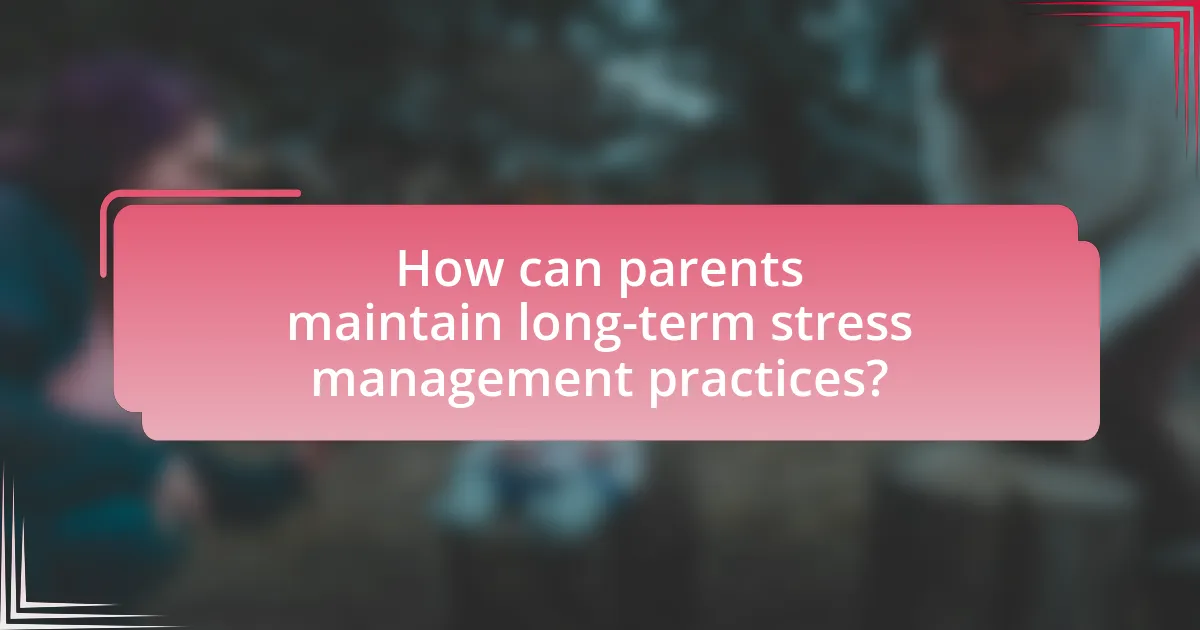
How can parents maintain long-term stress management practices?
Parents can maintain long-term stress management practices by establishing consistent routines, engaging in regular physical activity, and utilizing mindfulness techniques. Consistent routines provide structure, which can reduce anxiety and create a sense of control in daily life. Research indicates that physical activity releases endorphins, which improve mood and reduce stress levels. Mindfulness practices, such as meditation or deep-breathing exercises, have been shown to lower cortisol levels, the hormone associated with stress. By integrating these strategies into their daily lives, parents can effectively manage stress over the long term.
What role does self-care play in stress management for parents?
Self-care plays a crucial role in stress management for parents by enhancing their emotional resilience and overall well-being. Engaging in self-care activities, such as exercise, mindfulness, and adequate rest, allows parents to recharge and better cope with daily stressors. Research indicates that parents who prioritize self-care report lower levels of stress and improved mental health, which directly impacts their ability to manage family dynamics effectively. For instance, a study published in the Journal of Family Psychology found that self-care practices significantly reduce parental burnout, leading to more positive interactions with children.
How can parents carve out time for themselves amidst a busy schedule?
Parents can carve out time for themselves amidst a busy schedule by prioritizing self-care and setting boundaries. Establishing a routine that includes designated “me time” can help parents recharge; for example, scheduling short breaks during the day or utilizing early mornings or late evenings for personal activities. Research indicates that even brief periods of self-care can significantly reduce stress levels and improve overall well-being, as highlighted in a study published in the Journal of Family Psychology, which found that parents who engage in regular self-care report lower stress and higher satisfaction in their roles.
What are some self-care activities that parents can enjoy?
Parents can enjoy self-care activities such as yoga, meditation, reading, and engaging in hobbies. These activities promote relaxation and mental well-being, which are essential for managing stress in a busy household. Research indicates that practicing yoga can reduce stress levels and improve overall mental health, while meditation has been shown to enhance emotional regulation and decrease anxiety. Reading provides an escape and can improve cognitive function, and hobbies allow parents to express creativity and find joy outside of parenting responsibilities.
What resources are available for parents seeking support?
Parents seeking support can access various resources, including parenting hotlines, local support groups, online forums, and mental health professionals. Parenting hotlines, such as the National Parent Helpline, provide immediate assistance and guidance. Local support groups often offer community-based connections and shared experiences, while online forums like BabyCenter and What to Expect allow parents to engage with others facing similar challenges. Additionally, mental health professionals, including therapists and counselors, can provide tailored support for stress management and coping strategies. These resources are essential for helping parents navigate the complexities of raising children in a busy household.
How can support groups benefit parents dealing with stress?
Support groups can significantly benefit parents dealing with stress by providing emotional support, practical advice, and a sense of community. These groups create a safe space for parents to share their experiences and feelings, which can reduce feelings of isolation and anxiety. Research indicates that social support is linked to lower stress levels and improved mental health outcomes. For instance, a study published in the Journal of Family Psychology found that parents who participated in support groups reported decreased stress and increased coping skills. This evidence underscores the effectiveness of support groups in helping parents manage stress in their daily lives.
What online resources can provide guidance on stress management?
Online resources that provide guidance on stress management include the American Psychological Association (APA), which offers articles and tools for coping with stress, and the Anxiety and Depression Association of America (ADAA), which provides resources specifically for anxiety-related stress. Additionally, the Mayo Clinic’s website features comprehensive information on stress management techniques, including mindfulness and relaxation strategies. These organizations are reputable and provide evidence-based information to help individuals manage stress effectively.
What are some practical tips for parents to keep calm in a busy household?
Parents can keep calm in a busy household by implementing structured routines, practicing mindfulness, and setting clear boundaries. Establishing a daily schedule helps create predictability, reducing chaos and stress. Mindfulness techniques, such as deep breathing or short meditation, can help parents center themselves during hectic moments. Additionally, setting boundaries around personal time and family responsibilities allows parents to recharge and maintain their composure. Research indicates that structured routines can significantly lower stress levels in family environments, promoting a more harmonious atmosphere.










